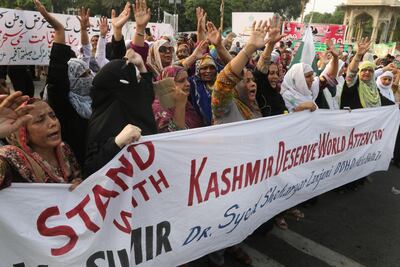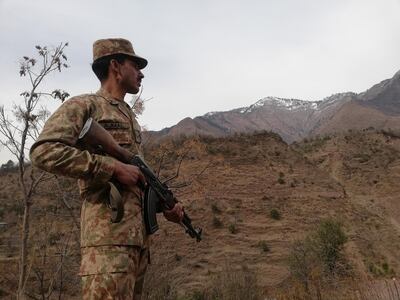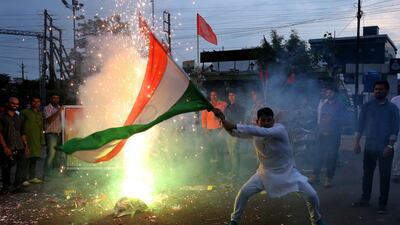Nadeem Namar’s life along the Pakistani side of Kashmir’s heavily militarised Line of Control is lived among crumbling roads, shattered schools and suspended phone lines.
At night, the sound of mortars fired by the Indian and Pakistani armies fills the air, followed by wailing infants and their mothers trying to soothe them back to sleep.
"Each and every Kashmiri is being ignored," Mr Namar, 34, a schoolteacher says. "We are helpless."
Last year, two of his pupils mistakenly picked up a fallen mortar while playing in a field near their school. It detonated in their hands, killing one and wounding the other.
When he was a pupil in Grade 3, the young Nadeem was walking with a classmate when a shell landed near by, killing his friend.
Like many Kashmiris, Mr Namar has intended to leave the volatile border areas for years due to the instability, but is drawn back by his family’s desire to stay near their ancestral home.
He struggles to submit applications for teaching jobs in Pakistan because most of the time the internet is suspended, or the phone lines shut off.
Mr Namar says that few people know what Kashmiris are experiencing.
“The people who are controlling the policies sit in New Delhi and Islamabad,” he says. “More than 99 per cent of Indians and Pakistanis are unaware of the real problems Kashmiris face.”
India and Pakistan's spiralling dispute
On Monday, India's Hindu nationalist government led by Prime Minister Narendra Modi signed a presidential decree abolishing Article 370, the constitutional provision that awards Indian-controlled areas of Kashmir special status and autonomy.
Home Affairs Minister Amit Shah said there were threats to the integration of Kashmir with the broader Indian republic.
Without the key constitutional provision in place, Kashmiris feel that the region’s demography will forever be changed.
It will pave the way for non-Kashmiri Indians to buy land, take up government posts and settle into the predominantly Muslim region, effectively changing its character.
During a parliamentary session on Tuesday, Pakistan's Prime Minister Imran Khan accused India’s government of having a “racist ideology” and said that they did not consider Kashmiris to be “equal human beings”.
“It is, in fact, ingrained in their ideology to put Hindus above those of all other religions and seek to establish a state that represses all other religious groups," Mr Khan said.
His administration is in a campaign to raise the Kashmir matter internationally, calling India’s action a breach of international law and UN Security Council resolutions.
But for ordinary civilians, India’s contentious move has renewed concern that violence will spill across the Line of Control and trigger unrest along one of the world’s most tense borders.
Mr Namar says that Kashmiris are, “as usual”, caught in the middle, facing neglect by the central government in Islamabad and the international community at large.
A 72-year conflict
In the shadow of the Himalayas, the picturesque but restive Kashmir region has been marred by conflict since 1947, when the region became contested territory between the newly independent India and Pakistan.
Since then two wars have been fought over the area, which remains divided by a Line of Control separating Indian and Pakistani-controlled territory.
There are regular exchanges of small arms fire and artillery across the border.
In February, a suicide bombing by a militant group based in Pakistan killed more than 40 Indian troops in India-controlled Kashmir, triggering air strikes and dogfights that threatened to spiral into another all-out war.

In 1947, the dawn of India’s independence from the British, India’s first Prime Minister Jawaharlal Nehru, a Kashmiri Hindu, announced in a radio broadcast: “We have declared that the fate of Kashmir is ultimately to be decided by the people.”
Under the auspices of the UN, the Kashmiris were to take part in a referendum to determine their destiny. It was a promise that went unfulfilled but lingers in the memory of many.
“We don’t think India and Pakistan are willing to resolve the Kashmir issue bilaterally,” says Mr Namar, who supports an internationally organised vote determined by the people.
“We want a solution to this crisis. Everybody wants to live in peace. No one wants to get killed or be collateral damage in a conflict.”
This summer, during a meeting with Mr Khan, US President Donald Trump offered to mediate the 72-year conflict between India and Pakistan.
He claimed that Mr Modi had asked him to bring the two countries to the negotiating table to resolve the entrenched dispute.
India immediately denied the claim, with a spokesman for the Ministry of External Affairs saying: "It has been India's consistent position that all outstanding issues with Pakistan are discussed only bilaterally.
"Any engagement with Pakistan would require an end to cross-border terrorism.”

The US State Department quickly echoed India’s line, calling the Kashmir issue a “bilateral issue for both parties to discuss”.
On Sunday, Mr Khan repeated his desire for Mr Trump to intervene, saying that now “is the time to do so. This has the potential to blow up into a regional crisis”.
'It's the Kashmiri people who suffer'
For Qaisar Javed, a student who grew up in the Kotli district of Pakistan-controlled Kashmir, India’s move to change the constitution was significant.
“People from Pakistani Kashmir are as worried about it as people are from Indian Kashmir,” says Mr Javed, 23.
When he was growing up, his teachers often cancelled classes and told parents to take their children home because shelling had begun across the border. The teachers would cry alongside their students.
“As a child, I thought the world was going to end,” Mr Javed says of the deafening roar of the artillery. “It was a horrible sound. It felt like my eardrums might burst.”
The lack of infrastructure around the Line of Control adds to the devastation. Residents do not have access to emergency medical care and cannot even take an ambulance without worrying that the vehicle might be hit.
In the spring, cross-border shelling and air strikes struck the school where Mr Namar works, partly destroying it.
“The damaged rooms remain unrepaired,” he says. “The students have to live with the situation. It costs them severely.”

Sometimes if a fresh wave of violence erupts, teachers move lessons outside, fearing that the school’s dilapidated buildings may provide the greatest hazard.
Schools near the Line of Control are routinely shut for several months a year, forcing many students to relocate if their families can afford to. If not, they simply drop out.
“In some cases, the schools are closed for more than four months but the students still have to compete in the same national exams and for the same jobs, and they will perform poorly,” Mr Namar says.
Attendance is low anyway as children stay at home to avoid the shelling.
Although the Pakistani state has offered free bunkers to vulnerable civilians living along the most exposed sections of the border, there is a long waiting list.
It can also be dangerous to try to walk to a bunker during a bout of shelling.
Kashmiris feel that little attention has been given to the price they have paid for the dispute.
Public interest on both sides of the border quickly fades whenever the most recent flare-up passes, but Kashmiris are frequently unable to leave their homes, go to the market or even travel to hospitals safely because of the threat of cross-border shelling.
Everyday decisions become life-or-death gambles.
“Kashmiri people are used as a shield for their personal gains,” Mr Javed says, referring to the Indian and Pakistani governments.
“Whenever there is tension, it’s Kashmiri people who suffer.”

